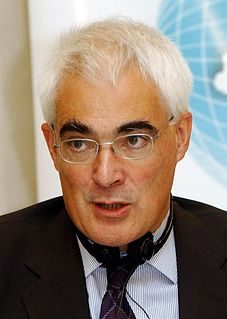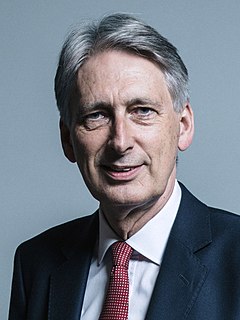
The Chancellor of the Exchequer, often abbreviated to Chancellor, is a senior minister of the Crown within the Government of the United Kingdom, and head of His Majesty's Treasury. As one of the four Great Offices of State, the Chancellor is a high-ranking member of the British Cabinet and is third in the ministerial ranking, behind the prime minister and the deputy prime minister.

Alistair Maclean Darling, Baron Darling of Roulanish, is a British politician who served as Chancellor of the Exchequer under Prime Minister Gordon Brown from 2007 to 2010. A member of the Labour Party, he was a Member of Parliament (MP) from 1987 until he stepped down in 2015, most recently for Edinburgh South West.

George Gideon Oliver Osborne is a former British politician and newspaper editor who served as Chancellor of the Exchequer from 2010 to 2016 and as First Secretary of State from 2015 to 2016 in the Cameron government. A member of the Conservative Party, he was Member of Parliament (MP) for Tatton from 2001 to 2017. He was editor of the Evening Standard from 2017 to 2020.

Philip Hammond, Baron Hammond of Runnymede is a British politician and life peer who served as Chancellor of the Exchequer from 2016 to 2019, Foreign Secretary from 2014 to 2016, and Defence Secretary from 2011 to 2014. A member of the Conservative Party, he was the Member of Parliament (MP) for Runnymede and Weybridge from 1997 to 2019.

Sir Daniel Grian Alexander is a former politician who was Chief Secretary to the Treasury between 2010 and 2015. He was the Member of Parliament (MP) for the Inverness, Nairn, Badenoch & Strathspey constituency from 2005 until the general election in May 2015. In his first parliamentary term (2005–2010), Alexander was the Liberal Democrat spokesperson for Work and Pensions (2007–2008), the Chief of Staff to party leader Nick Clegg, and Chair of the Liberal Democrat Manifesto Group (2007–2010).

Benedict Michael Gummer is a British businessman and former politician. He is a partner of Gummer Leathes, a property developer. He is a senior adviser to McKinsey & Company, the management consultancy, a visiting fellow at the Blavatnik School of Government at Oxford University and a member of the advisory board of the Office for Place.

David Cameron's term as the prime minister of the United Kingdom began on 11 May 2010, when he accepted Queen Elizabeth II's invitation to form a new administration, succeeding Gordon Brown of the Labour Party, and ended on 13 July 2016 upon his resignation. While serving as prime minister, Cameron also served as the first lord of the treasury, minister for the civil service and leader of the Conservative Party. He resigned following the 2016 referendum that favoured Brexit, which he had opposed.

The June 2010 United Kingdom Budget, officially also known as Responsibility, freedom, fairness: a five-year plan to re-build the economy, was delivered by George Osborne, Chancellor of the Exchequer, to the House of Commons in his budget speech that commenced at 12.33pm on Tuesday, 22 June 2010. It was the first budget of the Conservative-Liberal Democrat coalition formed after the general election of May 2010. The government dubbed it an "emergency budget", and stated that its purpose was to reduce the national debt accumulated under the Labour government.

The United Kingdom national debt is the total quantity of money borrowed by the Government of the United Kingdom at any time through the issue of securities by the British Treasury and other government agencies.

In the United Kingdom, the value added tax (VAT) was introduced in 1973, replacing Purchase Tax, and is the third-largest source of government revenue, after income tax and National Insurance. It is administered and collected by HM Revenue and Customs, primarily through the Value Added Tax Act 1994.

The United Kingdom government austerity programme is a fiscal policy that was adopted for a period in the early 21st century following the Great Recession. The term was used by the Coalition and Conservative governments in office from 2010 to 2019, and again during the 2021–present United Kingdom cost of living crisis.

The 2012 United Kingdom budget was delivered by George Osborne, the Chancellor of the Exchequer, to the House of Commons on Wednesday 21 March 2012.

The 2013 United Kingdom budget was delivered by George Osborne, the Chancellor of the Exchequer, to the House of Commons on Wednesday 20 March 2013.
Events from the year 2014 in Scotland.

The 2014 United Kingdom budget was delivered by George Osborne, the Chancellor of the Exchequer, to the House of Commons on Wednesday, 19 March 2014.

David Cameron formed the second Cameron ministry, the first Conservative majority government since 1996, following the 2015 general election after being invited by Queen Elizabeth II to form a new administration. Prior to the election Cameron had led his first ministry, the Cameron–Clegg coalition, a coalition government that consisted of members of the Conservatives and the Liberal Democrats, with Liberal Democrat leader Nick Clegg as Deputy Prime Minister.

The 2015 United Kingdom summer budget was delivered by George Osborne, the Chancellor of the Exchequer, to the House of Commons on Wednesday, 8 July 2015.
The National Living Wage is an obligatory minimum wage payable to workers in the United Kingdom aged 23 and over which came into effect on 1 April 2016. As of April 2022 it is £9.50 per hour and it is set to rise to £10.42 in April 2023. It was implemented at a significantly higher rate than the national minimum wage rate for workers under 25, and was expected to rise to at least £9 per hour by 2020. The consultation document issued by the Low Pay Commission in 2019 indicated that this target would not be met, instead proposing a figure of £8.67 per hour for the over 23 rate.

The 2016 United Kingdom budget was delivered by George Osborne, the Chancellor of the Exchequer, to the House of Commons on Wednesday, 16 March 2016.

George Osborne served as Chancellor of the Exchequer from 2010 to 2016 in the Cameron–Clegg coalition and Cameron majority government. His tenure pursued austerity policies aimed at reducing the budget deficit and launched the Northern Powerhouse initiative. He had previously served as Shadow Chancellor of the Exchequer from 2005 to 2010. He was succeeded by Philip Hammond.










